Is Stephen Harper 'Americanising' Canada?
- Published
- comments
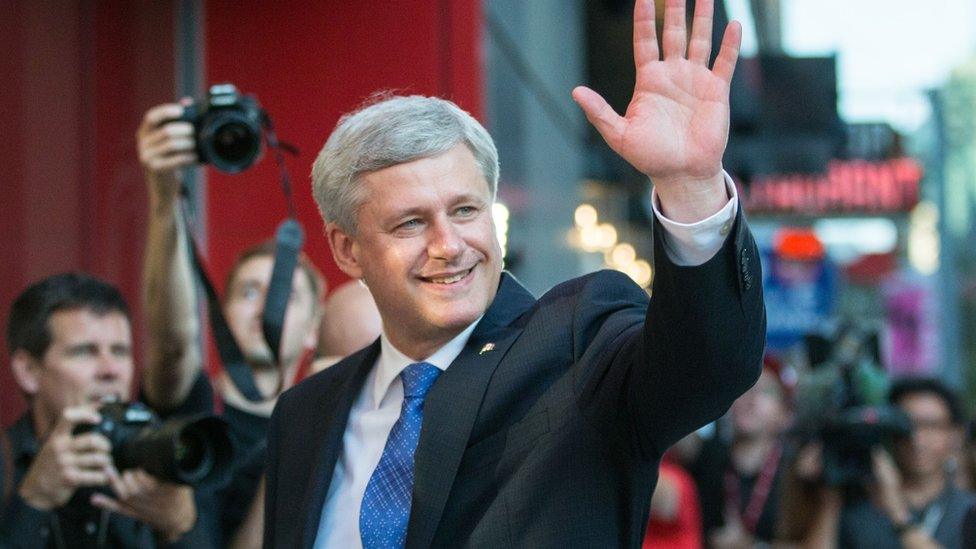
Canadian Prime Minister Stephen Harper's political opponents have a difficult time figuring out exactly which disliked US leader he most reminds them of.
Is it President Richard Nixon, external, with his mercurial temper, paranoid scheming, penchant for scandal and divisive politics? Perhaps it's the foreign policy hawkishness - fuelled by an evangelical certitude, external and oil patch brashness - of President George W Bush, external?
Or maybe it's not an American at all. One Canadian writer recently drew parallels, external to Russian President Vladimir Putin, with his "contempt for the media", anti-democratic tendencies and - yes - love of hockey.
It's the similarities between the Canadian prime minister and the conservative politics of his neighbour to the south that seem to come up the most, however.
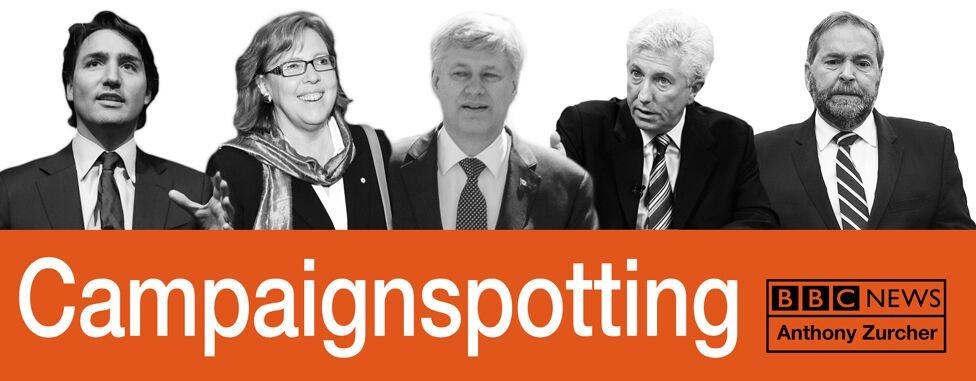
"Normal, peaceful, thoughtful Americans wouldn't enjoy it here anymore," Heather Mallick, writing in Harper's Magazine, external, tells those in the US who once looked to Canada as a progressive counterweight to their own nation's right-wing political drama. "We're becoming precisely what you're trying to escape."
Meanwhile, many American conservatives are touting Mr Harper's legacy, built over nearly 10 years in office, as he seeks to become the first Canadian prime minister in more than 100 years to win a fourth successive term in office next month.
"Conservatives, wherever they live, can be pleased with Stephen Harper," writes, external the National Review's Jay Nordlinger. "He is a leader of the West, an advocate of freedom, democracy, capitalism, human rights - Western civilisation, we could say."
"He is a leader who speaks our language, thinks our thoughts," Nordlinger concludes.
It's difficult to dispute that Mr Harper has a list of accomplishments that would make an American Republican blush.
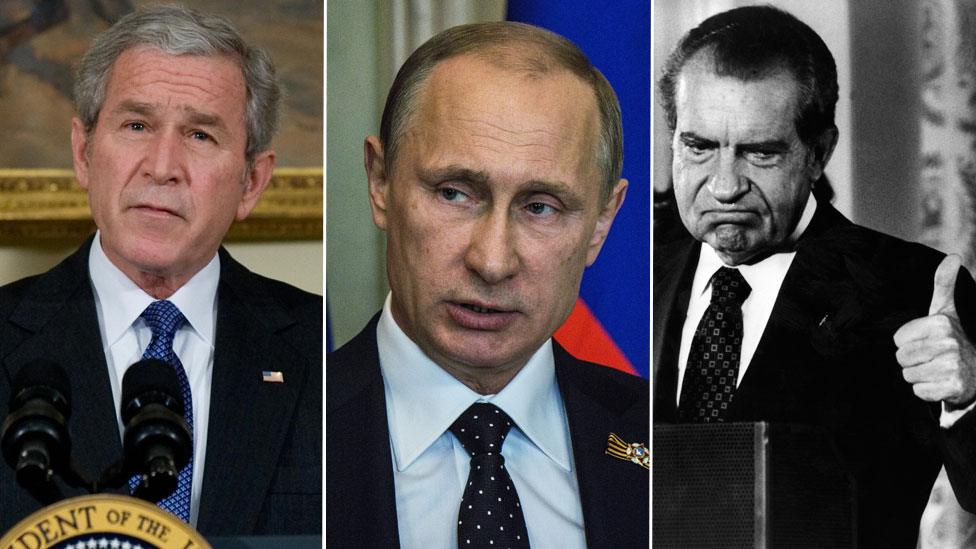
Stephen Harper has prompted critics to compare him to George W Bush, Vladimir Putin and Richard Nixon
His cuts to national consumption and income taxes have dried up money for social programmes - a "starve the beast" style of conservatism that first emerged during US President Ronald Reagan's rise to power during the 1980s.
He discontinued a national long-gun registry, boosted mandatory criminal sentences and increased funding for prison construction.
"Our government believes in standing up for victims of crime and their families, putting their rights and interests ahead of those of criminals, and that a prison sentence should mean what it says," Mr Harper recently said.
He's cut funding to government-funded research into climate change, pulled Canada out of the Kyoto Protocol agreement to control greenhouse gasses and - his critics allege - singled out environmentalist groups for tax audits.
He pushed stricter voter identification rules and cut funding to government election outreach efforts.
In foreign policy he's advocated Canadian air strikes in Syria, offered a full-throated support of Israel and amped up the "war on terrorism" rhetoric. Following the attack on the Canadian parliament building by a lone shooter last year, he pushed through Bill C-51, which increased government policing, information-sharing and surveillance powers.
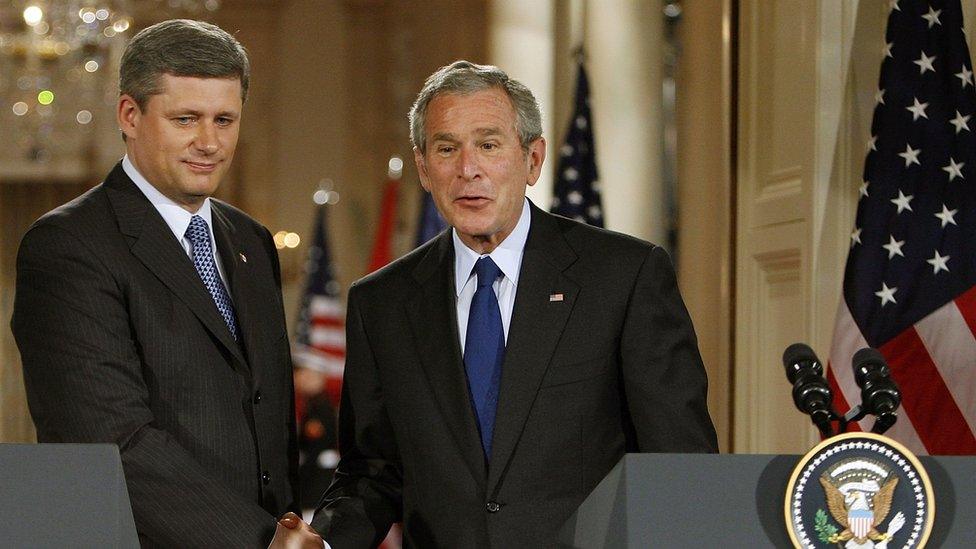
Stephen Harper has a record that has prompted praise from American conservatives
The rightward trajectory of Canadian politics, then, seems clear. Whether Canadians still support this course is increasingly in doubt, however.
The latest opinion surveys have Mr Harper's party polling around 30%, roughly even with the left-leaning Liberal Party and the New Democratic Party. In other words, nearly two-thirds of the Canadian public currently prefers something other than what the Conservative Party is selling.
In the hours before the Canadian leaders faced off in Calgary last week, Mr Harper's critics were out in force outside the debate site, chanting and hoisting signs. Many cited the above items as examples of how, in their view, Mr Harper has steadily pulled Canada away from its traditional moorings of tolerance, openness and good-government values toward a more divisive - read, American - style of politics.
"He's definitely brought the politics of division to Canada," said Alex Shevalier, an NDP supporter and president of the Calgary and District Labour Council. "I think there's a certain segment of the population that's anti-government, and he's figured out a formula to capitalise on it."
Emily Kaupp, a third-year student at the University of Calgary who supports the Liberal Party, said she didn't think Mr Harper "disrespected" the office, but the man who has been prime minister for much of her life is leading the nation in the wrong direction.
"Canada is losing its legacy as a country that helps in peacekeeping, and in other humane areas of society," she said.
In five words: How you feel about Canada
When BBC Pop Up asked its Canadian audience what they thought of the state of their nation's politics, many echoed these sentiments - that the Canada they know has changed.
"Harper's government has eroded Canada's standing in so many ways," writes Claire in Kingston, Ontario. "He has taken us backwards on climate change, offender rehabilitation, international relations, and research and development. He has implemented a 'tough on crime' policy that is in absolute opposition to the evidence on what works in reducing reoffending."
"The Canada that I was so incredibly proud of is now hardly recognisable after Harper's ideological onslaught the past 10 years," writes a reader from Edmonton, Alberta. "Harper came into office promising transparency and accountability, and fiscal prudence. But under his tenure the reality has been the very antithesis of that; we now have a government that is paranoid, secretive and controlling, and who has grossly mismanaged the public service and economy."
Heather in Saskatoon, Saskatchewan, writes: "We have had a leader who, rather than inspiring us to become more in our own eyes and in the eyes of the world, reminds us that we have to look out for ourselves and not others too. This, I think, is because of the idea that we will lose out if we don't see things his way."
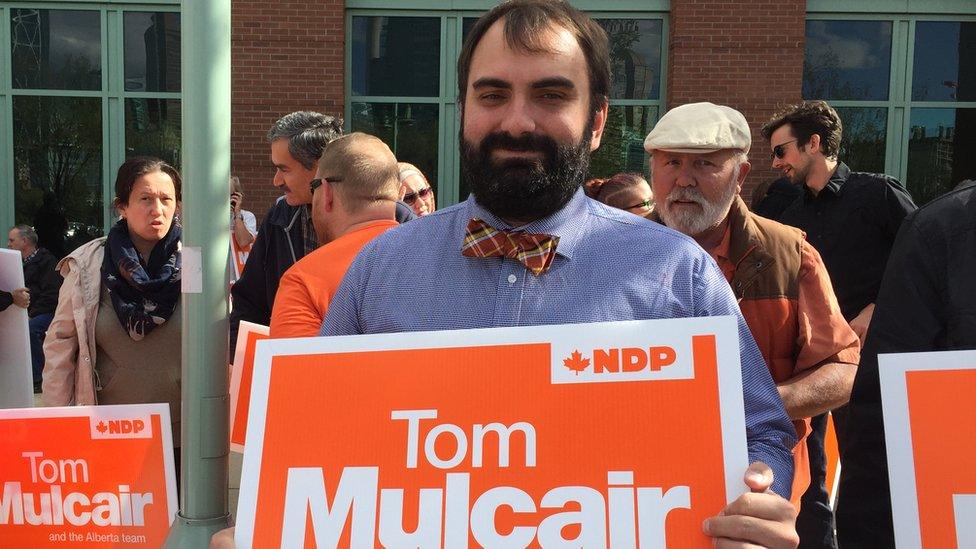
Alex Shevalier says Stephen Harper has brought a more divisive style of politics to Canada
Thanks in part to Mr Harper's long tenure in office, much of the passion during this campaign seems to be on the side of the opposition - which could explain the vehemence of the response to the BBC's request. The Conservative Party wasn't without its supporters, however.
Mr Harper, writes John in Calgary, Alberta, is a warrior who protects Canada and "keeps it strong".
"The job he has done has been remarkable to me,' he writes. "Even standing up for Israel when it looks like many others are turning away."
At the debate last week, Mr Harper's blue-clad supporters - while fewer in number - also fiercely defended their man's legacy.
"We've weathered a recession, and are currently weathering another one, better than any other country of the G-7," said Tyler Van Bliet, a first-year student at the University of Calgary.
"I think people forget that we'd be the envy of a lot of the world right now just for the way we've bounced back from these recessions. We've been able to keep jobs afloat, create new jobs, while keeping our taxes down low."
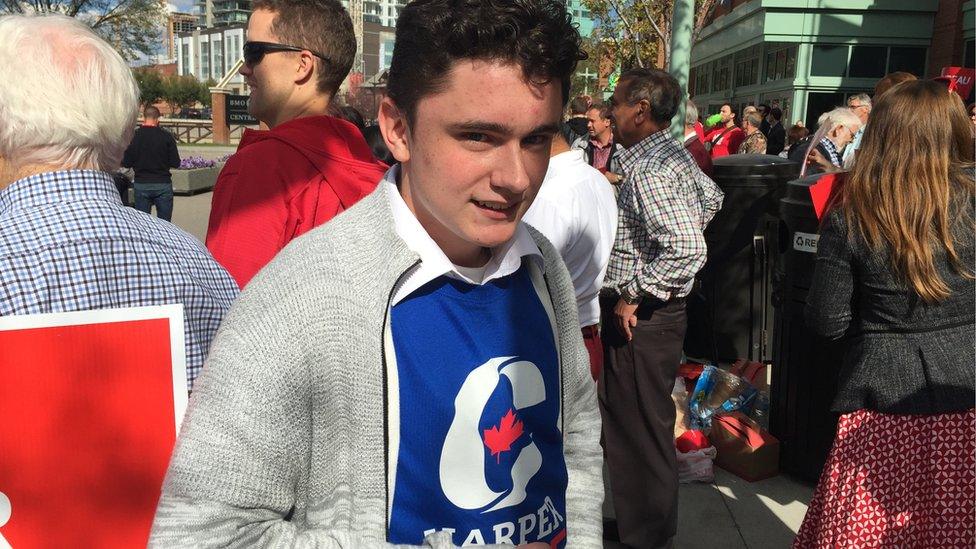
Tyler Van Bliet praises Stephen Harper's stewardship of the Canadian economy
Elvie Valeroso, a Philippine immigrant, said the Conservative Party has been good to her community. If there's one place Canadian-style conservatives have departed from their American counterparts - at least the Donald Trump wing of the party - it's in the quiet inroads Mr Harper has made with immigrant voters, in part through the savvy use of ethnic media.
"They have opened the door to our people in terms of needs in whatever capacity they can," Valeroso said. "Mr Harper is helping seniors and children and families, lowering the taxes and of course protecting the economy."
On 19 October Canadians will head to the polls. Like most elections when an incumbent party has held office for a long time, the vote will be, in part, a judgement on Stephen Harper, his legacy, and his vision of Canadian values and priorities.
"By saying what we will do and doing what we say, one step at a time, we are moving Canada in a conservative direction, and Canadians are moving with us," Mr Harper said in 2011.
The Canadian public will soon have a chance to tell him whether they still agree or if, in their view, their nation has gone south - in more ways than one.
- Published4 August 2015
- Published18 September 2015
- Published17 September 2015